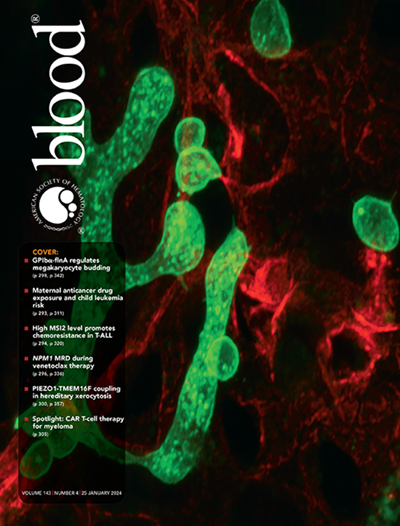A novel cause of type 1 von Willebrand disease: impaired exocytosis of Weibel-Palade bodies due to biallelic MADD variants.
IF 21
1区 医学
Q1 HEMATOLOGY
引用次数: 0
Abstract
The regulated secretion of von Willebrand factor (VWF) from Weibel-Palade bodies (WPB) in endothelial cells is fundamental to hemostasis. This process relies on recruiting Rab GTPases and their effectors to the WPB membrane, with the guanine nucleotide exchange factor (GEF) MAP-kinase activating death domain (MADD) playing a central role. Biallelic variants in MADD lead to a pleiotropic neurological and developmental disorder that can include bleeding abnormalities. This study investigates the impact of pathogenic MADD variants on VWF secretion using patient-derived endothelial cells. We isolated endothelial colony forming cells (ECFCs) from three pediatric patients with biallelic MADD variants and unaffected heterozygous family members. All patients exhibited low VWF plasma levels (22-30 IU/dL). Proteomic analysis of patient-derived ECFCs revealed an absence of MADD peptides, reduced VWF, and downregulation of proteins involved in the exocytotic machinery, including Rab3D and the Rab3/27 effector Slp4-a. Functional assays demonstrated diminished Rab27A and Rab3D activity and their failure to localize to WPBs in patient cells. Biochemical and live-imaging studies showed that histamine-induced VWF and VWFpp secretion were significantly reduced in patient cells due to delayed and reduced degranulation of WPBs. Our findings demonstrate the critical role of MADD in maintaining the secretion competence of WPBs and the magnitude of VWF secretion by regulating the recruitment of the endothelial exocytotic machinery. This study highlights the in vivo significance of WPB exocytosis in maintaining plasma VWF levels and establishes MADD as the first causal gene for quantitative von Willebrand Disease (VWD) in patients without pathogenic VWF variants.1型血管性血友病的新病因:由双等位基因MADD变异引起的Weibel-Palade体胞吐功能受损
内皮细胞中韦贝尔-帕拉德小体(WPB)分泌的血管性血友病因子(VWF)是止血的基础。这一过程依赖于募集Rab GTPases及其效应物到WPB膜上,其中鸟嘌呤核苷酸交换因子(GEF) MAP-kinase activation death domain (MADD)起着核心作用。MADD的双等位基因变异可导致多效性神经和发育障碍,包括出血异常。本研究利用患者来源的内皮细胞研究致病性MADD变异对VWF分泌的影响。我们从三名患有双等位基因MADD变异和未受影响的杂合家族成员的儿童患者中分离出内皮集落形成细胞(ECFCs)。所有患者均表现出低VWF血浆水平(22-30 IU/dL)。患者源性ecfc的蛋白质组学分析显示,MADD肽缺失,VWF减少,参与胞外机制的蛋白下调,包括Rab3D和Rab3/27效应蛋白Slp4-a。功能分析显示,患者细胞中Rab27A和Rab3D活性降低,无法定位到WPBs上。生化和活体成像研究表明,组胺诱导的VWF和VWFpp分泌明显减少,这是由于wpb脱粒延迟和减少。我们的研究结果表明,MADD通过调节内皮细胞外胞机制的募集,在维持WPBs的分泌能力和VWF分泌量方面发挥了关键作用。本研究强调了WPB胞吐在维持血浆VWF水平中的体内意义,并在无致病性VWF变异的患者中确立了MADD作为定量血管性血友病(VWD)的第一个致病基因。
本文章由计算机程序翻译,如有差异,请以英文原文为准。
求助全文
约1分钟内获得全文
求助全文
来源期刊

Blood
医学-血液学
CiteScore
23.60
自引率
3.90%
发文量
955
审稿时长
1 months
期刊介绍:
Blood, the official journal of the American Society of Hematology, published online and in print, provides an international forum for the publication of original articles describing basic laboratory, translational, and clinical investigations in hematology. Primary research articles will be published under the following scientific categories: Clinical Trials and Observations; Gene Therapy; Hematopoiesis and Stem Cells; Immunobiology and Immunotherapy scope; Myeloid Neoplasia; Lymphoid Neoplasia; Phagocytes, Granulocytes and Myelopoiesis; Platelets and Thrombopoiesis; Red Cells, Iron and Erythropoiesis; Thrombosis and Hemostasis; Transfusion Medicine; Transplantation; and Vascular Biology. Papers can be listed under more than one category as appropriate.
 求助内容:
求助内容: 应助结果提醒方式:
应助结果提醒方式:


